January 7, 2009, 11:08 am
Today’s PsychCentral.com highlights a recent study that found one in five teens are using cell phones and online technology to send sexually explicit pictures of themselves to others. The research is from the National Campaign to Prevent Teen and Unwanted Pregnancy and CosmoGirl.com. (Click here to read the original report.)
PsychCentral founder John Grohol, an expert in online psychology issues, says that the “online disinhibition effect,” the phenomenon that prompts people to say and do things in cyberspace that they wouldn’t ordinarily say or do in the real world, is strongly at work here. He notes that nearly one quarter of teens say that technology makes them personally more forward and aggressive. According to Dr. Grohol: Read more…
November 3, 2008, 3:58 pm
 A scene from The CW Network’s “Gossip Girl.” (Giovanni Rufino/The CW)
A scene from The CW Network’s “Gossip Girl.” (Giovanni Rufino/The CW)A new study making headlines today suggests teenage girls and boys who watch a lot of steamy television are more likely to become pregnant or cause a pregnancy.
But a closer look at the data shows the relationship between television, sexual content and teen pregnancies is complex. The same study, published today in Pediatrics, also found that teens who watch a lot of television in general are less likely to become pregnant. Read more…
October 13, 2008, 9:22 pm
When Addie Swartz was shopping with her 9-year-old daughter and friends, one of the girls noticed a scantily clad model at an Abercrombie & Fitch store. “Why do they have to do that?” one of the girls asked.
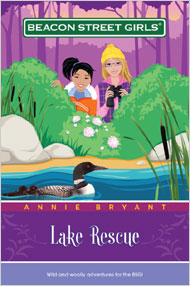 Lake Rescue offers inspiration to overweight girls.
Lake Rescue offers inspiration to overweight girls.Ms. Swartz describes it as an “aha” moment when the idea for a new book series came to her.
“It made me feel like the world is making them grow up so, so fast,” says Ms. Swartz. “It felt like there were so many messages out there that were bombarding her and her friends and girls her age.”
As a result, Ms. Swartz created the Beacon Street Girls book series. The stories, which revolve around five middle-school girls in Brookline, Mass., are shaped by leading experts in adolescent development, with the goal of helping girls build self-esteem and coping skills. Topics include the problems of an overweight girl and cyber bullying. This month the series will launch its latest book, “Green Algae and Bubblegum Wars,” a novel aimed at encouraging girls in science. The book is the result of a collaboration with Sally Ride, an astronaut who was the first American woman to orbit Earth.
But can expert health advice wrapped up as fiction really make a difference for the books’ young readers? A surprising new study suggests that for some girls, it can. To learn more, read my full Well column here.
And if you don’t know what your daughters are reading, check out this story from Naomi Wolf about the current crop of teen fiction.
What do you think of the current crop of teen literature? Has your child read a book from the Beacon Street Girls series? Please join the discussion and post your comments below.
August 18, 2008, 4:50 pm
Teenagers have the highest car crash and fatality rates of any demographic group, partly because they woefully underestimate driving risks. Injury prevention programs can change their perspective, a new study shows — at least for a while.
Toronto researchers studied 262 high school students participating in a one-day injury prevention program sponsored by their school and a local hospital. In addition to lectures about safety, the program included a tour of an intensive care unit, where students met young persons who had suffered a mild traumatic brain or a spinal cord injury.
A control group of teens were quizzed about driving safety before the talk, while others completed questionnaires about a week or a month afterward.
Their answers were troubling. The study found teens consistently underestimate driving risks and believe car and highway design are more likely than human error to cause a crash. The teens saw young age and agility as an advantage, helping them to better cope with poor driving conditions compared to more experienced drivers. Teens also believed that medical [trauma?] care, particularly in young people, is almost always effective. Read more…
July 18, 2008, 9:50 am
A broad analysis of childhood bullying and the link with suicide has found that it’s not just the victims of bullying who are at risk. Bullies themselves also are more likely to have suicidal thoughts.
The finding comes from a review of bullying research from 13 countries. Researchers from the Yale School of Medicine have found that both bullies and their victims appear to be at high risk for suicidal thoughts, according to the report published in the International Journal of Adolescent Medicine and Health.
“While there is no definitive evidence that bullying makes kids more likely to kill themselves, now that we see there’s a likely association, we can act on it and try to prevent it,” wrote lead author Dr. Young-Shin Kim, assistant professor at Yale School of Medicine’s Child Study Center, in a press release. Read more…
June 23, 2008, 12:58 pm
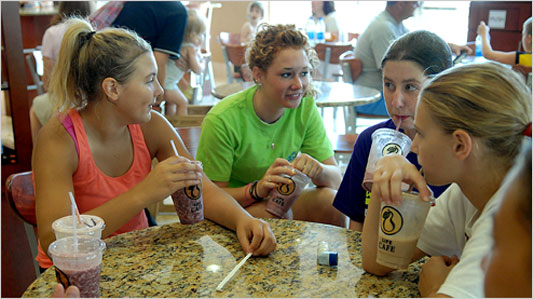 Young, fit and feeling fat? (Janet Hostetter for The New York Times)
Young, fit and feeling fat? (Janet Hostetter for The New York Times)At a time when much of the Western world is focusing on obesity problems, even teens who are at a healthy weight may develop a distorted body image.
That’s what German researchers found after surveying nearly 7,000 11- to 17-year-olds, asking them to describe their bodies. Options included far too thin, a bit too thin, just the right weight, a bit too fat and far too fat.
About 75 percent of the kids fell into the normal-weight category. However, half the normal-weight girls and a quarter of the normal-weight boys still described themselves as being too fat.
When those teens were given quality-of-life and self-esteem tests, normal-weight children who believed they were fat scored as poorly as children who really were obese. And normal-weight children who felt fat actually scored worse on family relationship questions than obese children. The findings were published in the current issue of Deutsches Ärzteblatt International, a German medical journal.
Although the data come from Germany, studies in the United States also suggest body image concerns are prevalent among American teens and adolescents. A 1999 study from the American Dietetic Association found that 55 percent of 7- to 12-year-old girls said they wanted to be thinner.
The data suggest that efforts to address unhealthy weight gain and obesity among young people have the the potential for “collateral” damage in normal-weight kids, who may develop self-esteem problems. An accompanying editorial noted that adolescents are exposed to considerable social pressure to be thin.
May 27, 2008, 9:54 am
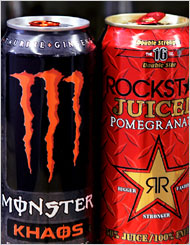 Energy drinks. (Pat Wellenbach/Associated Press)
Energy drinks. (Pat Wellenbach/Associated Press)With names like Rock Star, Full Throttle and Monster, it’s no wonder new super-caffeinated energy drinks appeal to teens.
But energy drink consumption is something parents need to think about too. As I write in today’s Well column, heavy consumption of caffeinated energy drinks may be a predictor of risky behavior by teens. In addition, teens and young adults are mixing alcohol and energy drinks, which can increase the risks associated with alcohol consumption.
To learn more about the caffeine content of the beverages your teen is drinking, check out the Web site Energy Fiend, which lists caffeine content of dozens of different beverages. Although I haven’t checked every item for accuracy, I have checked several of the listings and found the data to be reliable.
To read more about energy drinks and the association with risky behavior, read today’s Well column here. Are you a fan of energy drinks? Do you allow your teen to consume them? Post your comments below.
May 21, 2008, 5:13 pm
High school students who donate blood are more likely to experience complications like fainting and bruising than adult blood donors, according to a new study.
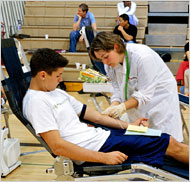 Teens are more likely to experience complications from blood donations. (Michael Paulson/Associated Press)
Teens are more likely to experience complications from blood donations. (Michael Paulson/Associated Press)The report, published this week in The Journal of the American Medical Association, comes at a time when the country is increasingly dependent on high school blood donors to maintain the nation’s blood supply. Restrictions limiting donation by people who have recently had tattoos or who have lived in high-risk countries have caused the pool of eligible donors to shrink to less than 40 percent of the United States population. Blood donors between the ages of 16 and 19 now account for about 15 percent of annual donations. Read more…
May 16, 2008, 2:10 pm
 Athletes who suffer concussions are at risk of a delayed recovery if they return to the field too quickly. (Carolyn Kaster/Associated Press)
Athletes who suffer concussions are at risk of a delayed recovery if they return to the field too quickly. (Carolyn Kaster/Associated Press)Student athletes who return to sports quickly after a concussion appear to have a slower brain recovery than teens who stay off the field longer, a new study shows.
The report, from The Journal of Athletic Training, suggests that athletes who suffer from even mild concussions should slow down their return to the sports field. In fact, students with less severe injuries appeared to be those who return to sports the fastest. But resuming intense physical activity appeared to slow their recovery and even exacerbated their symptoms.
“By continuing with high levels of activity, they began to exhibit similar symptoms to those who initially experienced a more severe concussion,” said Jason P. Mihalik, an athletic trainer from the University of North Carolina and an author of the study. Read more…
May 2, 2008, 11:29 am
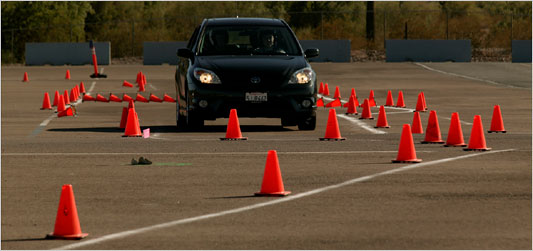 A teen leaves a trail of upended pylons while navigating Toyota’s challenging “distraction” course.
A teen leaves a trail of upended pylons while navigating Toyota’s challenging “distraction” course. What does it feel like to slam on your anti-lock brakes? What happens if you drive too fast on a slippery road? How do distractions like loud music affect your driving?
While driver’s education classes teach teens how to operate a vehicle, most of us don’t learn much about emergency driving conditions until we actually face an emergency. But a free advanced driving skills course offered by Toyota gives kids and parents a chance to experience real-world driving situations on a closed course. Participants maneuver through pylons, slam on brakes and speed around corners, all under the supervision of professional drivers. Read more…
May 1, 2008, 11:19 am
 Sexual harassment at school is surprisingly common. (Richard Perry/The New York Times)
Sexual harassment at school is surprisingly common. (Richard Perry/The New York Times)More than a third of middle- and high-school students may be victims of sexual harassment by their classmates, a new report shows.
The problem of sexual harassment from peers — which can include name-calling and unwanted touching in hallways and classrooms — is often largely dismissed as normal student behavior by school officials. However, the emotional toll of sexual harassment by school kids appears to be even worse than physical bullying, according to new research published this month in the journal Sex Roles.
“It happens in gym, on the school bus and when kids change classes,” said Susan Fineran, study coauthor and associate professor in the school of social work and women’s and gender studies at the University of Southern Maine. “And it’s who you’re sitting next to, who’s sitting behind you and in front of you.” Read more…
April 29, 2008, 6:28 am
This week, my Well column for Science Times focuses on the stress of the college admissions season and the heavy toll it takes on students. I asked three students, each in a different phase of the process, to share their stories about their efforts to get into college.
Phoebe Lett, 16, a day student at a private boarding school in Hightstown, N.J., is a junior in high school just beginning the admissions process.
I started my junior year believing that I would win acceptance to the right school simply by being myself. But no matter how hard I tried to block it out, I began comparing myself to other students. Advice from my pre-calculus teacher has stayed with me. He is a Princeton graduate, rumored to have received a perfect score on his SATs, speaks with a thick Jamaican accent and is currently training for the Olympics. Read more…
February 19, 2008, 7:43 pm
I wanted to ask a question I asked my science teacher today. Is it true that for boys who carry their phones in the pocket, it can cause problems with their sperm? – Posted by Riyah09
It sounds like an urban myth, but there is some limited data to suggest that cellphones can affect male fertility. In fact, last month a study in the medical journal Fertility & Sterility examined the cellphone use of 361 men at a fertility clinic. The results showed that the more men used cellphones, the lower the count, quality and motility of their sperm.
In October, the same medical journal reported on an animal study from Milwaukee researchers who found that rats exposed to six hours of daily cellular phone emissions for 18 weeks had a significantly higher incidence of sperm cell death than rats not exposed to such emissions. Read more…
February 15, 2008, 1:14 pm
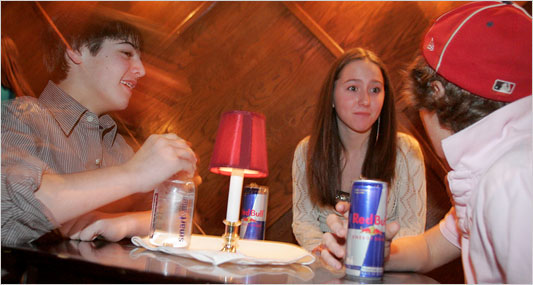 Dating and the 16-year-old boy. (J. Pat Carter/Associated Press)
Dating and the 16-year-old boy. (J. Pat Carter/Associated Press)The stereotype of the 16-year-old boy is that he has sex on the brain. But a fascinating new report suggests that boys are motivated more by love and a desire to form real relationships with the girls they date.
The report, published in this month’s Journal of Adolescence, paints a far different picture of teen boys than the stereotype of testosterone-fueled youth. Psychology researchers from the State University of New York at Oswego surveyed 105 10th-grade boys whose average age was about 16. The boys, most of whom said they were heterosexual, were given surveys asking them to select various reasons why they asked girls out, dated and pursued physical relationships. Most of the boys had dating experience, and about 40 percent were sexually active. Read more…
February 14, 2008, 1:07 pm
At least 82 children have died in recent years as a result of playing the “choking” game, a bizarre but increasingly common practice, according to the Centers for Disease Control and Prevention.
The game, which involves intentionally trying to choke oneself to create a brief high, has been around for years, but it appears to be spreading. One theory is that the Internet has made it easier for kids to learn about the game. A search of YouTube turns up several videos warning about the practice, but also several troubling demonstrations by giggling adolescents showing how to play. Read more…





















 Healthy living doesn't happen at the doctor's office. The road to better health is paved with the small decisions we make every day. It's about the choices we make when we buy groceries, drive our cars and hang out with our kids. Join columnist Tara Parker-Pope as she sifts through medical research and expert opinions for practical advice to help readers take control of their health and live well every day. You can reach Ms. Parker-Pope at
Healthy living doesn't happen at the doctor's office. The road to better health is paved with the small decisions we make every day. It's about the choices we make when we buy groceries, drive our cars and hang out with our kids. Join columnist Tara Parker-Pope as she sifts through medical research and expert opinions for practical advice to help readers take control of their health and live well every day. You can reach Ms. Parker-Pope at 

